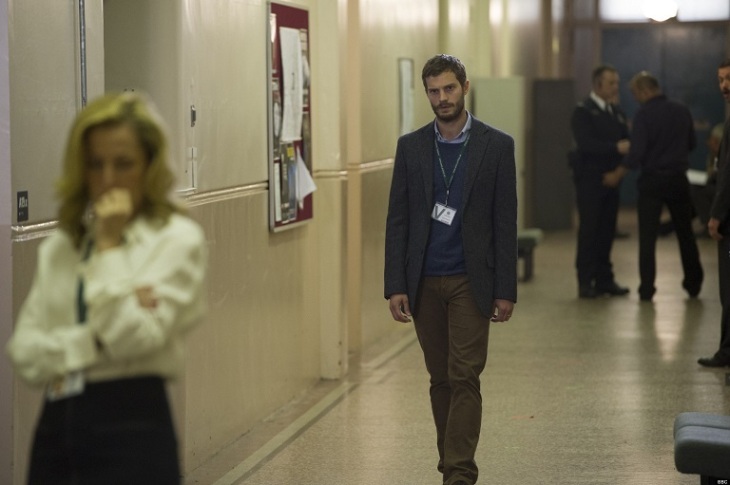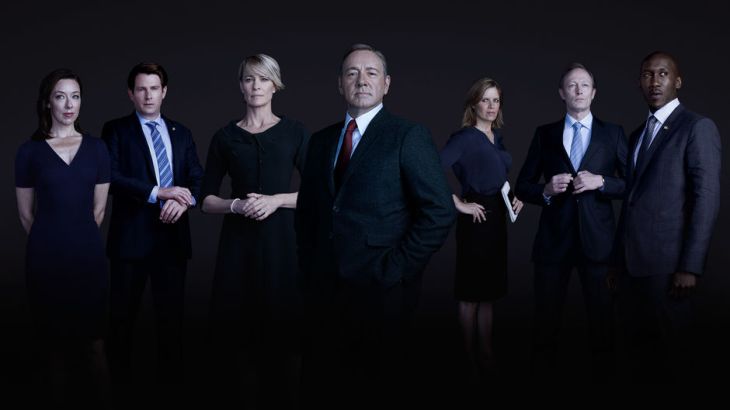
Serial killer Paul Spector (Jamie Dornan) watches Detective Superintendent Stella Gibson (Gillian Anderson) with keen interest.
The Fall is the greatest show I’ve ever seen
I’m going to warn you that I do say that with the kind of hyperbolic glee akin to the satiated fanaticism of some 15 year old sci-fi nerd who just saw Star Wars for the first time in 1977. Because I’m pretty into the murder mystery genre right now, and not so much with the whodunnit aspect, but with the all too fascinating why. After too many episodes of Snapped, I’ve realized that the story doesn’t necessarily end with the killer in handcuffs, but the killer being interrogated in a way that may or may not bring a sense of the humane into the already very obvious psycho. And, of course, The Fall fits that bill–or, more accurately, transcends it.
I don’t want to give too much away, even though we know from the get-go who the killer is. As Heat-ian cat-and-mouse games often go, it’s more about the how the criminal gets caught, and why the criminal does what he/she does. The show stars two of the finest actors to ever grace a television series–Gillian Anderson and Jamie Dornan. If these two actors didn’t work, this entire show would fall apart, but as fate would have it–they work, and very much so. Anderson plays an English police detective, Stella Gibson, brought to Belfast to review the police department, only to find herself investigating the murders of young, professional, dark-haired women; she concludes that the murders are linked and are the work of a serial killer. And unbeknownst to everyone, Paul Spector (Dornan), family man and grievance counselor by day, is a serial killer by night.
At first glance, Gibson appears cold and distant to a point of asexuality, but as the show goes on, she becomes increasingly womanly in what can be traditionally perceived as contradictory. Gibson is maternal and sexual, tough and scared–both embodying feminism and boldly challenging our perceptions of what is stereotypically feminist. Anderson gets all that and plays it brilliantly. And it’s shocking that such a character is written by a man–Allan Cubitt, the writer, creator, and director of season two; that said, Cubitt has a deep understanding of women and feminism to write a character and a show that interprets a post-feminism Europe with the kind of self-assured self-awareness that he articulates so well through his sense of character, setting, and story. Gibson is followed by a cast of other female characters–a pathologist, a cop, a mother, a daughter, a teenage girl–and while not all of them are strong and independent, they are certainly complex in their own unique ways. Only a man who celebrates womanhood could write the kind of female characters that Cubitt has so respectfully crafted.
Of course, it’s no coincidence that Gibson’s foil is a man who preys on women socially perceived as strong and independent–the assumed archetypes of the feminist movement–and who Gibson casually labels a misogynist. Yet, the audience gets to intimately know Spector in a way that Gibson doesn’t–we see very clearly that he’s a man who genuinely loves his children, is genuinely concerned about his domestic abuse patient, is genuinely remorseful after realizing he has murdered a pregnant woman. Sure, it’s easy to instantly label a man who controls, murders, and objectifies his female victims a misogynist, but the situation is more complex when that man struggles to objectify women he knows because, well, he is able to empathize with them as fellow human beings.
And it’s even harder for the audience to hate a man that we’ve gotten to know. Part of the great trick that Dornan’s performance plays on us–and what a sympathetic performance it is–is that, despite the fact that he has gruesomely murdered three women, we feel that there are some crimes that are beneath him. Even when the Spectors’ teenage babysitter comes on to him, we feel like we don’t want to add pedophile on the list–and in that weird way, we can oftentimes find ourselves rooting for him to become a better man–to not manipulate the young girl more than he already has, as we’re constantly counting on the good in him. But as Spector’s judgment day looms ever closer, we see, in season two, his day and night personas gradually merge as his daytime activities have become damage control for his sins of the night–yet we still feel for him, we still chuckle at his remarks, our hearts soften when he interacts with his daughter. There’s a beauty to Dornan’s layered, difficult performance, yet sadly, he couldn’t become superstar-famous until he signed on (i.e., sold his soul) to a certain movie franchise starring as a certain C.G.
Like all dramas of this nature, Gibson and Spector’s relationship does take center stage. Despite the fact they share very little actual screen time together in the show’s two seasons, Cubitt writes these characters as very connected people, not just because the story dictates it, but their characters’ very existence dictates it. Yes, they are both stone cold, meticulous people, but they can also be soft, hurt, lost–all colored by an intense degree of personal and professional moral ambiguity. That parallelism becomes very apparent when they finally meet face to face and it appears that they both share, arguably, an almost primal attraction to each other–sexual, or not, it doesn’t matter because any attraction must remain unspoken–that, in all its perversity, makes a world of sense.
I would even argue that Spector correctly assumed Gibson’s Electra complex as he himself may have his own Oedipus complex, as Gibson implied–point is, these two get each other. And what a relief that after all the unshared screen time between them and how their chemistry has been dependent on phone calls woven together in the editing room, the chemistry–of antagonism, of attraction, of repulsion, of fascination–in their scenes together in the same room are real and vital. How lucky is this show to have successfully gambled on two actors to be such equally matched characters; there had to be electricity when Anderson and Dornan inhabit the same space, and lo and behold, there was.
All two seasons (eleven episodes total) are on Netflix; that said, you should watch all of the episodes now. Season three is coming out soon and both Anderson and Dornan are set to return.
